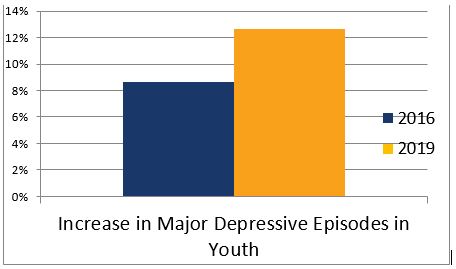Research supporting the work we do at Mental Health America of Northwest Indiana in prevention and early intervention is shared below.
This information is shared from our national Mental Health America agency in its 2019 State of Mental Health. Mental Health America and all affiliates are committed to promoting mental health as a critical part of overall wellness.
We advocate for prevention services for all, early identification and intervention for those at risk, integrated services, care and treatment for those who need it, and recovery as the goal.
For direct access to the report and supporting data, visit https://www.mentalhealthamerica.net/issues/state-mental-health-america.
Summary
- Fifty percent of Americans will meet the criteria for a diagnosable mental health condition sometime in their life.

Of those 50%, half will develop conditions by the time they are 14 years old.
- In the past 4 years, there has been an alarming increase in the number of major depressive episodes in youth (12-17) from 8.66% to 12.63%.

- Indiana ranks 46th out of 50 states and the DOC for youth (12-17) with at least one Major Depressive Episode (MDE) in the past year.
- The number of US youth experiencing a MDE increased by 175,000 from last year.
- Indiana ranks 50th out of 50 states and the DOC for youth (12-17) with at least one severe Major Depressive Episode (MDE) in the past year.
- The number of US youth experiencing a severe MDE increased by 100,000 from last year.
Where do we start?
At the beginning
- Research shows that the first five years of a child’s life are critical for setting the foundation for lifelong health, learning, and success and that childhood experiences, both positive and negative, have a significant impact on lifelong health and well-being.
- Adverse Childhood Experiences (ACEs) is the term given to describe all types of abuse, neglect, and other traumatic experiences that occur to individuals under the age of 18.
- The landmark Kaiser ACE Study (1995-1997) examined the relationship between these experiences in childhood and reduced health and well-being later in life.
- The ACE Study looked at three categories of adverse experience – abuse, neglect, and family dysfunction.
- Almost 2/3 of respondents reported at least one ACE
- The majority who reported at least one, reported more than one ACE
Why is this so important?
- Because ACES can have lasting effects on our behavior and health well into and throughout our adulthood

- Toxic stress caused by ACEs affects short- and long-term health, and can impact every part of the body

So what can we do?
- The wide-ranging health and social consequences of ACES underscore the importance of preventing ACES before they happen.
- Safe, stable, and nurturing relationships and environments can have a positive effect on a broad range of health problems and on the development of skills that will help children reach their full potential.
- The CDC recommends the following strategies to prevent ACES
- Parent support programs for teens and teen pregnancy prevention
- Home visiting to pregnant women & families with newborns
- Parenting training programs
- Sufficient economic supports for families with lower incomes
- Mental illness and substance abuse treatment
- high quality childcare
- intimate partner violence protection
- Family-friendly work environments (work/life integration & balance)
At Mental Health America of Northwest Indiana, we are proud to champion these strategies through various programs and services. Last year, our team completed over 15,000 home visits, serving close to 3,500 children and parents in Northwest Indiana with proven programs that educate, empower and strengthen the way families function for life.
